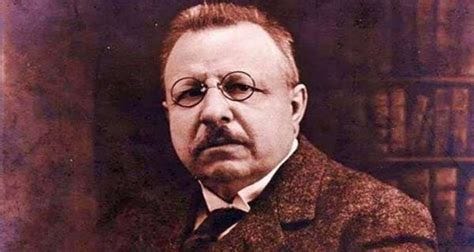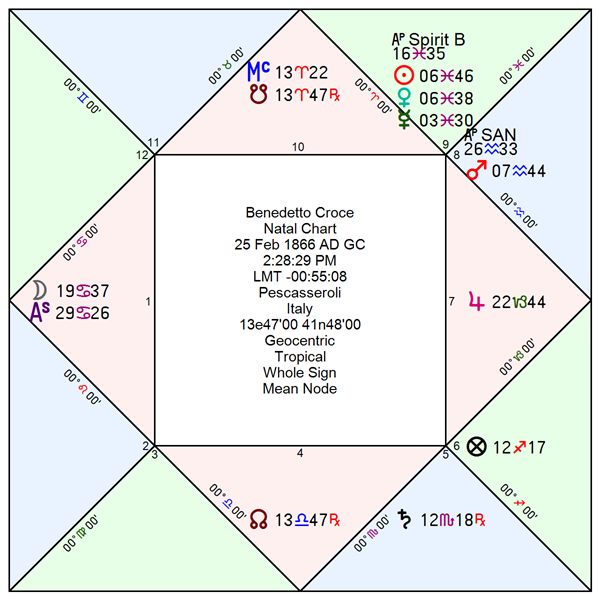Last week’s natal database entry for Benito Mussolini discussed how Jupiter in Cancer, the sign of Jupiter’s exaltation, could be corrupted by the Moon’s configuration. This week’s entry for the Italian philosopher Benedetto Croce shows the other side of the story—specifically, how a philosopher signified by Jupiter in Cancer, as seen through Mussolini’s horoscope, managed to thread the needle between principled opposition to Mussolini’s Fascist regime and avoiding arrest or execution. Croce’s horoscope features the Moon in Cancer in the 1st house, in the bound of Jupiter, which links him to Mussolini through synastry: Croce’s Moon at 19° Cancer 37′ is conjunct Mussolini’s Jupiter at 18° Cancer 32′.
In short, Mussolini was willing to tolerate limited dissent among high-level academics in order to preserve the illusion of pre-Fascist cultural leadership. I suggest Croce was able to survive under extremis because his natal Venus was closely conjunct the Sun in what is known as cazimi, which translates as “in the heart of the Sun.” In this way, Croce (Venus) was protected by Mussolini (Sun).
Benedetto Croce was born on February 25, 1866, in the remote town of Pescasseroli, nestled in Italy’s Abruzzo region. His early life was marked by tragedy. At just 17, Croce lost his parents and sister in a devastating earthquake, an experience that left him both inward-looking and fiercely independent. With a considerable inheritance, he devoted his life to scholarship, largely free from the constraints of earning a living. Though he enrolled in law school at the University of Naples, Croce abandoned formal studies to immerse himself in philosophy, history, and literature.
Croce’s intellectual journey placed him at the heart of Italy’s cultural life in the early 20th century. Influenced by Giambattista Vico and the German idealist tradition, particularly Hegel, Croce formulated his own version of absolute idealism, which he called historicism. His first major work, Aesthetic as Science of Expression and General Linguistic (1902), argued that art was not a matter of sensory pleasure but the pure expression of intuition. This was followed by What Is Living and What Is Dead in the Philosophy of Hegel (1907), where he stripped Hegelianism of its metaphysical pretensions and recast it as a philosophy of history and culture. For Croce, liberty was never a static right; it was a conquest renewed in every age—a hard-won achievement of civilization constantly threatened by tyranny.
His intellectual stature led to a prominent role in public life. In 1910, Croce was appointed to the Italian Senate and later served as Minister of Public Education from 1920 to 1921. Initially, he viewed Mussolini’s rise with cautious optimism, imagining that Fascism might be a passing episode. But the brutal reality of the regime soon shattered that illusion—especially after the 1924 assassination of Socialist leader Giacomo Matteotti, an act widely blamed on Fascists. From that moment, Croce became one of Fascism’s most formidable intellectual adversaries.
On May 1, 1925, Croce published his famous Manifesto of the Anti-Fascist Intellectuals in response to Giovanni Gentile’s earlier pro-Fascist declaration. The timing—International Workers’ Day—was deliberate. In clear and forceful language, the manifesto condemned Fascism as a “moral illness” and a betrayal of Italy’s liberal heritage. Croce asserted that intellectuals had not only the right but the duty to defend freedom of thought against authoritarian encroachment. The document quickly attracted hundreds of signatures and stood as a public rallying point for anti-Fascist sentiment in Italy’s embattled cultural sphere. For this act of defiance, Croce became known as the “moral conscience of Italian antifascism.”
The risk was real. In 1926, Fascist squads ransacked Croce’s home and library, a clear warning of the danger he faced. Yet he refused to back down. Croce never joined the underground resistance, but his writings and example gave courage to those who did. He mocked Mussolini’s regime as an onagrocrazia—a “government by asses”—and refused to comply with its 1938 racial decrees. Somehow, he survived intact, perhaps because Mussolini tolerated a symbolic opposition figure for appearances’ sake.
After the fall of Fascism, Croce returned to public life briefly, serving in the postwar government and helping lay the foundations of Italy’s new democratic order. By the time of his death on November 20, 1952, he had published over 80 books and countless essays on philosophy, history, literature, and politics. Through his journal La Critica (1903–1952), Croce shaped generations of Italian intellectuals.
A century later, Croce’s voice still resonates. His warning that liberty must be defended anew in every age feels urgently contemporary. The Manifesto of the Anti-Fascist Intellectuals, written in the shadow of dictatorship, remains a call to conscience: a reminder that ideas matter, and that when freedom is threatened, silence is complicity.
ADB Rodden Rating AA, Quoted BC/BR, 2:00 PM, ASC 23CA46
Proposed rectification: 2:28:29 PM, ASC 29CA26’18”
Rectification details available in excel workbook (Paid subscriber member benefit)
Victor Model factors favoring Venus/Pisces (revised from Jupiter/Capricorn)
Bound ruler of Sun and Lot of Fortune
Venus in sign of exaltation, her own bound, and the diurnal triplicity ruler of water signs
Cazimi solar phase
Angular from the Lot of Fortune (4th from LOF)
Received by Jupiter
Physigonomy model factors favoring Pisces (rising decan), Capricorn (rising decan ruler)
Pisces: fleshy and phlegmatic face, large torso
Capricorn: shape of face is ovate
Moon’s Configuration: Moon separates from Saturn and applies to Jupiter
The aspect sequence is as follows:
1. Moon in Cancer: separates from the trine of Saturn
2. Moon in Cancer: applies to the opposition of Jupiter
3. Notable configuration: Victor of the chart is the cazimi Venus/Pisces
Phase 1. Moon separating from Saturn (Scorpio, retrograde, 5th house)
Symbolism: Early trauma, emotional gravity, death, and inward discipline
Biographical Match: Croce’s childhood was permanently marked by the 1883 Casamicciola earthquake, in which both his parents and his only sibling died. He was buried for hours beneath rubble and narrowly survived. This is consistent with the 5th house as 8th from the 10th, death of the mother; and Saturn in Scorpio retrograde functioning like Saturn in Taurus in the 11th house, 8th from the 4th, death of the father. As a result Croce received a large inheritance which he used to support his academic career and role as a public intellectual.
Phase 2. Moon applying to Jupiter (Capricorn, 7th house)
Symbolism: Moon in Cancer opposed to Jupiter in Capricorn in the 1st – 7th house axis suggests either advocacy (planet in the 7th functioning as Croce advocating a personal cause) or fighting with open enemies. This aspect alone cannot tell us which is the case. To sort this out, because it can ONLY be one of the two, one needs a fuller horoscope analysis.
Biographical Match: For Croce, the cazimi Venus in Pisces is the victor of the horoscope. Together with Mercury in Pisces, this Mercury-Venus-Sun stellia signifies his career as Italy’s leading philosopher of aesthetics. While Jupiter in Capricorn does rule the Pisces stellia, it comes from a place of opposition. Under Mussolini’s fascist nationalism, Croce resisted calls from pro-Mussolini artists and philosophers to support the state. In this context, Jupiter in Capricorn in the 7th signifies open enemy fascists which caused Croce to further retreat into a position of strength projected, ironically, by Mussolini himself. This shows the power of the cazimi Venus to resist outside influences. We know that Jupiter in Capricorn signified open enemy fascists because the May 1, 1925 publication of Croce’s Manifesto of the Anti-Fascist Intellectuals was published on the exact date of his Jupiter return. As to Croce’s relationship with Mussolini, Croce was never arrested, he only faded from view during the Mussolini era. Mussolini himself has both Venus and Jupiter in Cancer in his 9th house, consistent with the influence of benefics on philosophy and higher education. Mussolini did not risk attacking Croce and other intellectuals in order to avoid condemnation from other countries for his fascist policies.
AI Notice: ChatGPT contributed to this article.
Keep reading with a 7-day free trial
Subscribe to House of Wisdom to keep reading this post and get 7 days of free access to the full post archives.



